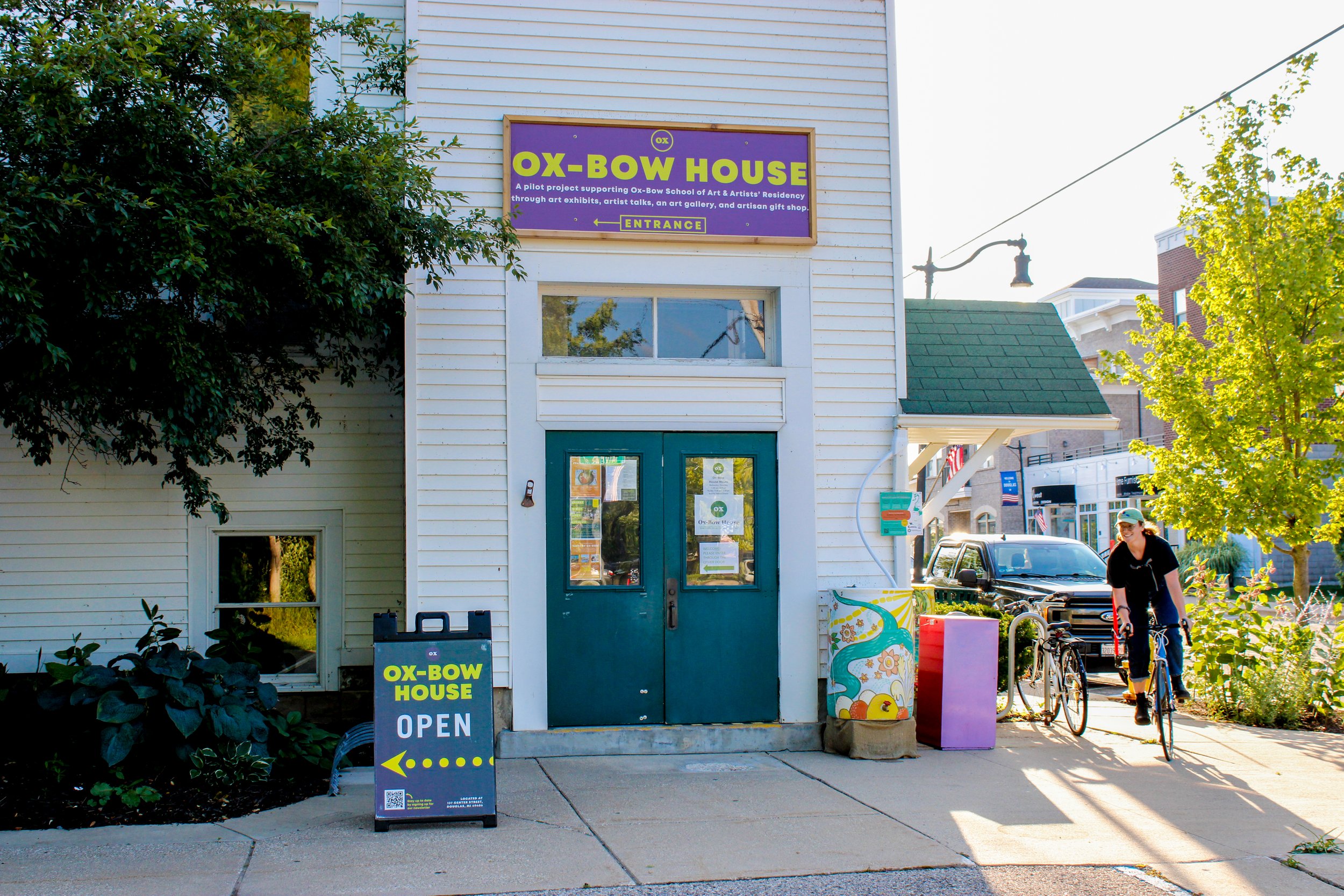Photo by Ian Solomon, 2023 LeRoy Neiman Fellow (photography & communications)
Ox-Bow House
a place for fellowship, education and art
Ox-Bow House is a pilot project by Ox-Bow School of Art, a 112-year old, independent summer art school that has been welcoming artists from around the nation and beyond to West Michigan since its founding in 1910. Ox-Bow’s classes, workshops, residencies, and public programs are developed in-house by a professional staff of artists, curators, and educators. With a vibrant community of nationally and internationally respected artists on their campus each year, Ox-Bow House seeks to extend this resource to the public through a diverse menu of programs throughout the year.
The name Ox-Bow House acknowledges the legacy of this historic building as a place for community and celebrates the idea that our house will be a charming place to stimulate learning and exploration. This accessible location will be a welcoming space for our community neighbors in western Michigan as well as summer visitors to Douglas and Saugatuck. We are planning a comfortable environment where guests can partake in refreshment while digging deep into meaningful and open conversations over the arts. “We are thrilled about joining the Center Street community in Douglas this summer with our newest initiative, Ox-Bow House," Steve Meier, Board President says, "our extension here will help cultivate deeper connections between our artists and art-lovers through a range of opportunities to connect, converse, learn and appreciate the ground-breaking work happening in artist's studios today.”
Ox-Bow House will be home to an exhibition hall, space for programming, and a retail environment for curated art and design objects by alumni and artists from throughout the region and beyond. In addition to artistic programming, Ox-Bow House will also be home to our administrative office and archives, the latter being made available to the public for research in 2023.
Ox-Bow House will open its doors to the public on June 10th, 2022 with the exhibition Summer School of Painting, a summer-long exhibition of contemporary painting curated from Ox-Bow’s 2022 faculty by Interim Director of Academic Programs, Maddie Reyna. Alongside the exhibition, Ox-Bow House will feature a calendar of artist talks, performances, and other public programs throughout the summer, including a partnership with the Library of the Great Lakes, whose mission is to inspire and support exploration of the science, history, literature, arts, and cultures of the Great Lakes region.
Over 2022-2024, Chicago-based architect Charlie Vinz (Adaptive Operations) will be in-residence at Ox-Bow House. Vinz is well known for his work with artists and cultural organizations on adaptive-reuse design, applying a sustainability lens to architecture. A suite of programs, including workshops, lectures, and a publication, will be programmed throughout 2022-2024 as Ox-Bow House takes shape. “Charlie is the perfect fit for Ox-Bow House,” Shannon Stratton, Executive Director stated, “he brings an impressive background working with and designing artist-led community and project spaces like Theaster Gates’ Stony Island Arts Bank, Buddy at the Chicago Cultural Center and The Storehouse in Galien Michigan. We are excited to fold him, his work, and his network into Ox-Bow’s education mission over the next two-years as Ox-Bow House and its design evolves: look for design lectures, workshops and other programs that connect with West Michigan’s long history in American design.”
Ox-Bow House Hours
Monday Closed
Tuesday 10:00–5:00
Wednesday 10:00–5:00
Thursday 10:00-5:00
Friday 10:00-5:00
Saturday 10:00-5:00
Sunday 10:00-5:00
*HOLIDAY HOURS: Ox-Bow House is closed from Christmas Eve till Jan. 4th.
and For Special Events
View our upcoming events here
stay up to date
Stay up to date on what is happening at Ox-Bow House by signing up for our newsletter! Click the ‘SIGN UP’ button below.
Ox-Bow House is located at 137 Center Street, Douglas, MI 49406
Meet Charlie Vinz Architect-in-residence
Charlie Vinz (b. 1980, Wisconsin) is an architect, artist, and educator based in the Upper Midwest. In his approach, cultural production is an open-ended process. Charlie draws from ambient resources, materials, spaces, and narratives and applies them towards the construction of new contexts in objects and environments in order to reframe, transpose, and question them. Central to his practice is the allowance for fluidity to exist between a finalized thing and the path to that thing, in addition to fluidity in the function and purpose of the thing. Through processes found in architectural design and pedagogical models, Charlie’s projects attempt to buttress shared built environments and close loops on circular economies.
Charlie attended architecture school at the Illinois Institute of Technology (B.Arch ‘04) and studied abroad at the Bauhaus Universitat Weimar in Germany in 2002. While a student, he was a model maker at Holabird & Root, where he then worked as a junior architect until 2007. During this time, Charlie became involved in AREA Chicago as an editorial advisor and contributor, served as an organizer and exhibition planner/designer for Versionfest and Select Media Festivals, and participated in his first artist residency at Art Shanty Projects (with Becca Grady, Ilana Percher, and Aay Preston-Myint).
From 2007-11, while working as a designer for Antheus Capital and then Tom Brock Architect, Charlie developed youth design-build apprenticeship programs with After School Matters entitled Learning in the Built Environment and Design Build Grow Eat, as well as co-founded a bi-monthly series for designers/educators working with people marginalized by design institutions called Potluck for Engaging Design. In late 2010, he began managing, developing, and designing projects for Rebuild Foundation and artist Theaster Gates, all with an emphasis on transforming marginalized spaces and objects currently deemed as liabilities into ones in which other systems of value could be understood and realized. With Theaster, he worked on projects in Omaha, St. Louis, and Chicago, culminating with the Stony Island Arts Bank.
From 2014-2017, Charlie was the Creative Director at Rebuilding Exchange, a non-profit building materials reuse warehouse, where he focused on designing and building exclusively within the building materials wastestream in a process that also incorporated a jobs training program for people with barriers to employment. He also established an artist-in-residence program, organized event series, screenings, and panel discussions. In a partnership with the Chicago Department of Transportation, Chicago Transit Authority, and Preservation Chicago, he salvaged and installed the 1894 facade of the Madison and Wabash elevated train station in the Rebuilding Exchange warehouse.
Since 2013, Charlie has worked as an architecture and design practitioner under the name Adaptive Operations, which has been his primary focus since 2017, when he became a licensed architect in the state of Illinois. Adaptive Operations undertakes commercial projects such as the hospitality spaces Parachute, Wherewithall, and Life On Marz Community Club, art spaces such as Watershed, Buddy, and Narrow Bridge, in addition to private residential spaces and homes. He has exhibited in group shows such as Making Chances at Gallery 400, All Good Things Become Wild and Free at Carthage College, Spontaneous Interventions at the 2012 Venice Architecture Biennale and the Chicago Cultural Center, the 2018 Thailand Biennale, and Successful Failures at the Chicago Cultural Center. For Stockyard Institute’s 2021 retrospective at DePaul Art Museum, he designed and fabricated a radio station (WYSR) for use during the exhibition, which then traveled to the Union for Contemporary Arts in Omaha, NE.
Charlie is not building a wall but making bricks.
Efroymson Family Fund
Ox-Bow is happy to announce that the Efroymson Family Fund has awarded Ox-Bow School of Art & Artist's Residency a three-year grant. The funds will support Ox-Bow House and assist in funding our three-year pilot adaptive reuse project as we transform the space into a tool for community engagement.





